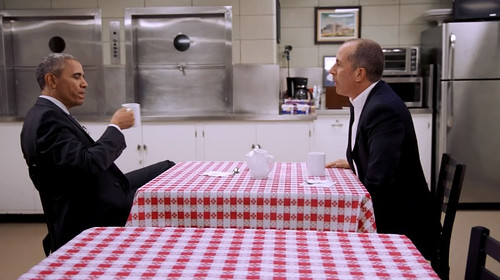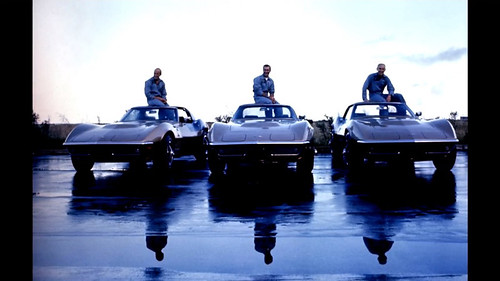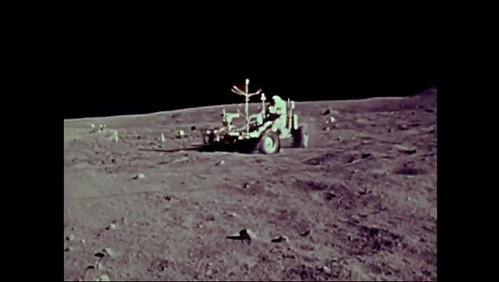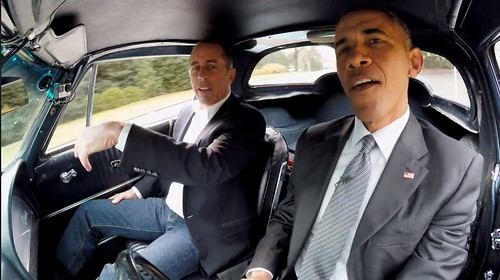There are people who read rags like Star, Globe, The National Enquirer, and so forth to find out what’s really going on in the world of celebrities and people in the news. What’s the scoop with Madonna? Is Kanye really like that? Did Brad and Angela get another kid?
Why do we do this? It’s one thing to gossip about people in your circle of acquaintances, but why trade in gossip about people who you don’t know, likely will never meet, and who play no direct role in our daily lives?
But they DO play a role, do they not, in our imaginative lives?
The one’s I’ve mentioned – I just grabbed their names out of the air, though I suppose I could have gone to the supermarket and checked the current headlines – are entertainers. They act in movies, or on TV, or they sing, or entertain us in some other way. They are important to us for what they pretend to be. They also live lives we imagine to be impossibly and unapproachably glamorous. And so we’re curious about what they’re really like. Just what that means in a world where Coke’s the real thing, that’s another matter.
Do you think they’re curious about one another? It’s not like they all know one another; there are too many celebrities and others “in the news” for that. Do they read the tabloids? I have no idea.
But let me ask a more specific question: Do you think that Barack Obama, for example, is at all curious about Jerry Seinfeld, for example? Seinfeld, of course, is a very well known entertainer with lots of fans, many of whom must be curious about what his life is really like. Barack Obama is not an entertainer, but, as the current President of the United States, he is certainly very well known. And, as Presidents go, he’s more glamorous than most.
But, you see, there’s the man, Barack Obama, and there’s the job he holds, as President of the United States. They are not the same thing. And last year both of them, the man and the job he holds, were guests on Jerry Seinfeld’s web series, Comedians in Cars Getting Coffee. The title pretty much gives you the premise, Jerry Seinfeld interviews in comedian while driving him or her to an from a place where they drink some coffee. Strictly speaking, Barack Obama is not a comedian; he’s a politician. As such he’s something of a performer and he does have a sense of humor. Close enough.
These conversations are not scripted. But the shows are edited from three to four hours of raw footage down to about 10 to 20 minutes that go up on the web. What we see and hear is what Seinfeld crafted out of that unscripted conversation.
* * * * *
Seinfeld picks Obama up at the Oval Office in a 1963 Corvette Sting Ray. The coolest American car for the coolest American president – those aren’t Seinfeld’s exact words, but that’s the sentiment. At about five minutes into the episode Seinfeld remarks: “Do you ever think about every person you talk to is putting on an act, a total show?” Obama: “It’s a problem.” Of course their little drive doesn’t get past the guard at the gate and they have to abort the mission. Seinfeld turns back and the go into the White House.
Now, I don’t know why Seinfeld posed asked that question in the first place. I’d imagine it was something he’s thought about a lot over the years. He’s been in the public eye for years and so has an acute sense of the difference between his life and how he appears to others. And he is surely sufficiently rich and famous that people want to play him for their own benefit. Perhaps he’d made a mental note to ask Obama about it at some point and perhaps he didn’t. Why? Because inquiring people want to know, that’s why. He asked the question, Obama allowed as how it was a problem, and that exchange went into the memory banks.
Let’s jump ahead. We’re in what appears to be the White House commissary and we’re at about 13:50 into the episode.
* * * * *
Jerry Seinfeld: How many world leaders do you think are just completely out of their mind.
Barack Obama: A pretty sizeable percentage.
JS: Now these people, you must meet them, you must be chatting, and you see in the eyes, you look in the eyes, you go Oh…
BO: Yes.
JS: this guy’s gone.
BO: And part of what happens is these guys, uh, I think the longer they stay in office, the more likely that is to happen.
JS: Of course.
BO: Right.
JS: They loose it.
BO: I mean, you just, at a certain point your feet hurt, an’ you’re having trouble peein’, you have absolute power, and…
JS: Privilege is toxic.
BO: It really is.
JS: Sadly. Things that people struggle to achieve, get to positions of power, influence, money, can do things. It has a toxic effect on their judgment.
BO: Yes. Has that happened to you yet?
JS: No.
BO: Why is that do you think? Let let let me ask you.
JS: Come on, you do some work.
BO: You’re a funny guy.
JS: Thank you.
BO: You go on some late night talk shows, people think you’re funny
JS: yeah
BO: they give you a show
JS: right
BO: and then next thing you know you’ve made like a ridiculous amount of money.
JS: So much more than you. And yet, how do I seem to you? Do I seem spoiled, out of touch…?
BO: Well I don’t know.
JS: So you have a pretty good instinct for people?
BO: Right now you seem like a completely normal guy.
JS: But I’m putting on an act, like everyone else does for you.
BO: That’s my point. That’s what I’m getting at.
JS: Right.
BO: But, I’m gonna’ probe this. The question is, how did you calibrate dealing with that? At a certain point you might have thought to yourself “You know what, I’m more than just a comedian…
JS: Nah.
BO: I’m gonna make a Jewish version of Citizen Kane.” You know. How did you keep perspective?
JS: I’ll give you the real answer. It’s gotta be similar to your life. I fell in love with the work.
BO: Um huh.
JS: And the work was joyful. And interesting, and that was my focus.
BO: So, now that you’re like a quasi-retired man of leisure…
JS: I work a lot.
BO: Do you?
JS: Yeah.
BO: Are you still doing stand-up?
JS: Are you still making speeches?
BO: Do you still get hecklers? What’s your theory of handling hecklers?
JS: I say “You know what, you seem upset. I’m so sorry, I know that’s not why you came in here. Let’s talk.”
* * * * *
Let’s do a quick recap. Seinfeld asks Obama about the sanity of world leaders and that leads to a discussion of how wealth, power, and fame can corrupt a person – a familiar theme. Then Obama asks, “Has that happened to you yet?” The conversational dynamic is about to change.
Though it doesn’t take place before an audience and Seinfeld isn’t behind a desk, this IS a talk show and he’s the host. It’s his job to draw the guest out, to keep the conversation going. But now Obama is quizzing Seinfeld: “Let let let me ask you.”
How does Seinfeld respond?
“Come on, you do some work.” That is to say, I’ve been hosting this conversation, drawing you out. Now it’s your turn. You work, and I’ll relax for a second.
Obama goes to work: Seinfeld’s funny; he does the talk show circuit; gets his own TV show “and then next thing you know you’ve made like a ridiculous amount of money.” That is, he’s entered the danger zone, where all that money, fame, and influence might lead him to think he’s something special, a higher kind of being. And yet, as Obama remarks, “Right now you seem like a completely normal guy.”
At this point Seinfeld’s memory banks start flashing and he pulls out that earlier remark about how everyone’s putting on an act for Obama; he points out that he’s doing the same thing at this very moment. So he’s acting for Obama and, who knows? maybe Obama’s acting for him. Of course they’re both acting for us. Is it all an act?
Or is it art?
How does Seinfeld respond? “I fell in love with the work. And the work was joyful. And interesting, and that was my focus.” If I may translate a bit, he committed himself to something bigger than himself – comedic performance – and that’s what keeps him grounded.
He goes on to tell Obama that he continues to do stand-up. That’s a theme that turns up in other episodes of Comedians in Cars Getting Coffee and in various interviews Seinfeld has given in the past several years. Getting up in front of a live audience keeps him real. The comedy is an act, but the audience response is real. If it isn’t funny, they’re not going to laugh.
So … stand-up keeps Seinfeld real despite his fame and wealth. He hops into a 1963 Corvette, takes Obama for a spin around the White House grounds, they chat over coffee, and Obama, the man, the private individual, asks him for a reality check.
* * * * *
Recall, however, Barak Obama is not merely an individual human being. He’s also President of the United States of America. That’s the source of his power and fame. The Presidency and all it does isn’t something Obama created. It's something he occupies.
This episode of CCGC is shaped by that fact in a way that makes this episode quite different from the other ones. In most of the other episodes Seinfeld and his guest drive around a bit before sitting down for coffee. In this episode, sure, Seinfeld picks Obama up at the Oval Office, but we know very well they’re not going to get off the White House grounds.
Seinfeld sets us up for this even before he picks Obama up. Each episode of CCGC opens with Seinfeld introducing that episode’s car. We get close-up shots of details – tail pipe, the engine, dashboard, key-in-the-ignition, whatever – then the whole car; Seinfeld tells us a bit about it. And so it goes for the 1963 Corvette he uses in this episode.
Astronauts and their Corvettes.
But the introduction is more elaborate than usual:
In the 60s and 70s all American astronauts in the space program drove Corvettes. When you drive a Saturn V at work you cannot get out of that and into a Country Squire wagon. […] The idea behind this car is just confidence. This came from an American culture that would just say things and do them without having any idea how.
We’re gonna’ put a man on the moon. How we gonna’ do it? When we gonna’ do it? Why are we doin’ this? No idea, we just did stuff. Crazy but great.
And I think this cool blue is just the right color for my are you kidding me super special guest today, the Commander-in-Chief of the United States of America, President Barack Obama.
The effect of this interlude linking Corvettes to the space program is to drive home the metaphysical connection between cars and the nation and thus to connect that symbolism firmly to the Presidency. This is no mere private individual we’re dealing with. This is the driver of a machine created through myth and symbolism.
The mere fact that they cannot drive the car off the White House grounds – recall that they tried in the beginning and a guard stops them – reinforces the fact that Obama is President. As such the movements of the private man, Barack Hussein Obama, are restricted. At the end, Seinfeld lets Obama drive the car. That’s a favor to the private man, not the President. But it’s the President who can’t drive the car off the White House grounds.
Obama at the Wheel
Now what have we got? We’ve got a famous and wealthy comedian driving, having coffee, and chatting with the President of the United States. They chat about various things, one of them being the temptations and problems of being powerful and famous. What’s interesting is that Obama is as curious about Seinfeld as Seinfeld is about Obama. They might as well be like the rest of us, standing in the check-out line of the supermarket and eyeballing, maybe even buying, The National Enquirer.
Inquiring minds want to know. And now we do.
* * * * *
I've got more posts about Seinfeld over at New Savanna.




